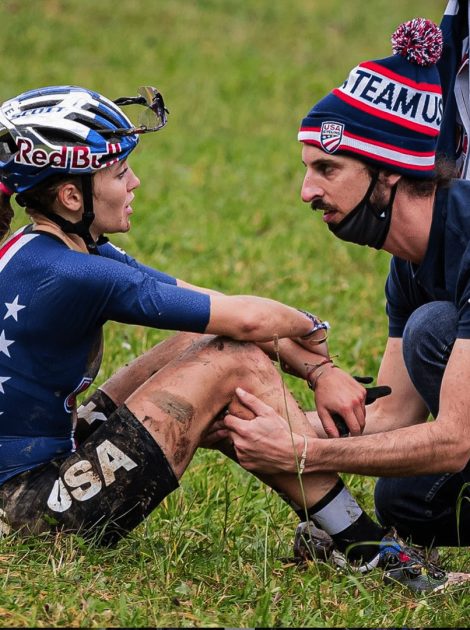How to lose races?
Koorosh Academy
How to lose the competition and prepare again?
Before we begin the "How to lose" article, I would like to attract your attention to an article on a topic similar to the one we are talking about. "How does it feel to lose the Olympics? And how do you pick yourself back up again?"
This article is about Kate Courtney's first experience at the Olympics. (Kate Courtney is an American cross-country pro cyclist who won the world championship in 2018 at 22).
It was very interesting for me and I think reading it can help athletes and non-athletes a lot to face the challenges of sport career and life.
In the following, I will write the parts of it that were interesting to me so that we can read it together.

Participating in competitions is not consistently winning and gaining the desired position. In most competitions, three people win race podiums, and more than three permanently temporarily lose a professional athlete. They will experience failures on the way to success. But does anybody teach us how to lose? Are we pessimistic or weak if we think about not achieving the desired podium and try to be ready to digest it? Failure to achieve the desired position of the athlete or the position that those around him expect from the athlete sometimes puts psychological pressure on the athlete. Most importantly, the pressure can significantly impact the sport and personal life of the person. These failures sometimes lead to future victories as an experience and sometimes cause you to give up professional sports forever! Now, which category that we belong to? I will go back to the education that we have had and the way we look at these issues. In my opinion, human beings are born without a previous mentality, and this education tells us to see every subject as good or bad.


On the other hand, the correct way to deal with these issues is not things that should be done only by the athlete, part of the pressure is due to social networks, and sometimes the family or even the coach can inadvertently make this stress many times harder.
Often after competitions, the athlete feels that he was not enough to make the coach or the family or, on a larger scale, his country proud. Unfortunately, sometimes the issue does not end with this bad feeling and the pressures created without talking. Cooperating with a series of negative comments often makes the bad situation worse.
“Kate Courtney:
The overwhelming outpouring of positivity and support I’d received before my race gave way to a wave of consolation and criticism, especially online. Standing on such a big stage has downsides, especially when fans have unprecedented access to athletes through social media. It can be a source of immense support, inspiration, and meaning, but it is also where cruel voices are most eager to share their analysis, judgment, and advice. The positive voices still far outweighed the negative, but the negative comments seemed to resonate the most with my inner dialogue. You let everyone down. You are no longer competitive. You aren’t mentally tough enough And should be satisfied with this result since it’s clear you aren’t capable of more.
Our brains are wired to fixate on the negative, and despite my best efforts to shrug off or, better yet, not read the comments, they felt loud, unavoidable and damaging. They provided ample fuel for the doubt and disappointment I already felt.”

Well, what we read is much easier than what people experience after such failures. It does not matter if it is a failure in the competition or not getting a good grade on the entrance exam. Many other issues have such a reflection on people's lives and cause others to allow themselves to give unprincipled and negative opinions.
Following Ms. Kate Courtney: “I was overwhelmed by the support from my friends, family and even those I hardly knew people who believed in me because I raced for their flag. I lined up feeling grateful, prepared and optimistic. Then, I fell off an emotional cliff. From the start, my race didn’t go to plan. In a race where I had hoped to be fighting for a medal, I found myself fighting just to stay in the top 15. My body and mind felt out of sync, unable to push toward a goal that now seemed so far out of reach.
At a certain point, it became a battle just to finish. After 82 minutes and 19 seconds of racing, I crossed the finish line, and it was over. A moment I had been working toward for years was now behind me, along with the feeling of purpose and motivation that had pushed me so hard for so long.
Falling short of my goal only made that emptiness worse. My heart broke in front of what felt like the whole world, and then I was quickly sent home to pick up the pieces alone.”

End of Ms. Courtney's talk. There is an issue that arises in my mind. I think we have all had more or less the same experiences. I do not know why, when we know how hard it is so, why people are doing some work for others. Maybe the moment we comment or say something, we do not think how much stress this expression of our opinions can put on that person. Or we know, and sometimes we say this because of our cruelty and badness. Or maybe because it was about competing with the country's flag, the citizens of that country allowed themselves to criticize their representative. For those who give negative comments, again, a question arises for me. Are those who write she not strong enough themselves? If so, why are they not in the place of these athletes in competitions? Please participate in the competitions if you think you are better than others!

I want to ask your opinion. If you left a comment for this lady, would you give a positive comment and thank you, or an adverse judgment
The first part of our talk was more about society. Still, another factor that can make these judgments more or less is the behavior of the athlete himself, which we will discuss in the following article entitled "Lies."
source:

Latest Videos
What is new?
If you enjoy watching them please subscribe to our YouTube channel, So you won’t miss any of future videos.